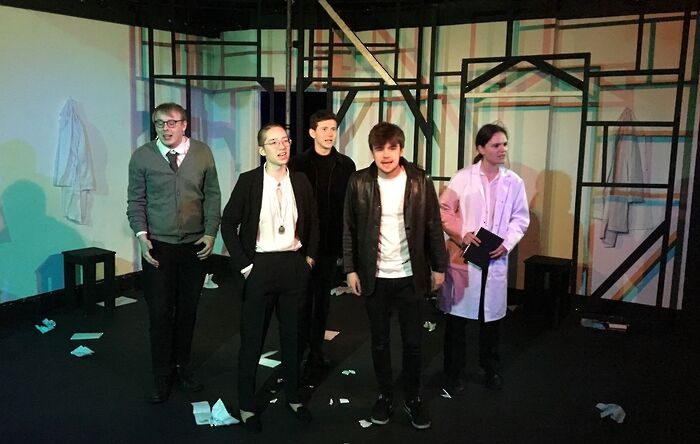Private Peaceful review
A cohesive and emotionally arresting staging of Michael Morpurgo’s novel

To say Private Peaceful, a staging of Michael Morpurgo’s 2003 novel, is a poignant piece of theatre would be an understatement. Using the Fitzwilliam College Auditorium as a canvas, director Caolan McConnaughie paints a powerful picture of the loss of innocence in the face of tragedy. The play follows Tommo Peaceful, whose starry-eyed naïveté is captured well by Daniel Ellis, as he grows up in rural Devon alongside his brother Charlie (Imogen Gander) and their close friend Molly (Hannah Mitchell). When Charlie enlists to fight in the First World War, Tommo follows him to the frontlines and learns the horrors of war first-hand.
"What the performers perhaps lacked in experience, they made up for twofold in commitment to the roles"
The show is strongest in the ways it handles potential setbacks. The staging is sparse, but effective; a cot, two tables and a handful of chairs as the only props focus attention on the brilliant performances, but leave a lot of empty room. Thankfully, the lighting design expertly guides us through a variety of spaces, from Ellis and Gander’s clandestine childhood meeting, lit only by torchlight, to the claustrophobic red glare of the trenches.
Similarly, having the actors play multiple roles could have weakened individual characters, but instead effective casting helps to cement the themes of the piece. Mitchell brings a sweetness to both of Tommo’s objects of affection, before and during the war, Molly and Anna respectively. Jake Marshall is endearing first as Big Joe and later as the inspiring Captain Wilkes. Leon Hewitt is a standout, commanding the stage as a constant antagonistic force, from the strict schoolmaster Mr Munnings, to the mean-spirited Colonel who torments the Peaceful family, to the sadistic Sergeant Hanley.

Sound and music play an important role in the piece: a mix of recorded and live audio brings the stage to life. There were a few misses, most notably the lack of rifle sounds made what was a supposed to be an intense raid on a German trench into a game of charades. Even so, in general sound design seems cogent and effects were used sparingly, such that their absence came across as deliberate – every moment of silence is intentionally loud. It would be remiss not to mention Ellis’s beautiful performance of the nursery rhyme Oranges and Lemons, a song I didn’t know could have so much emotional depth. This childhood marker is a recurring motif, which seems to take on a different, and certainly darker, meaning with each new iteration.
Occasionally, this sound mixing does drown out some of the more softly-spoken actors, making the scenes difficult to follow, especially given Private Peaceful’s non-chronology. Voice aside, performances were also a little uneven toward the beginning of the first act, though this could be chalked up to nervousness. What the performers perhaps lacked in experience, they made up for twofold in commitment to the roles: Vee Tames was memorable as Mrs Peaceful, giving us a downtrodden, though enduringly strong mother, willing to sacrifice for the sake of her sons. This came across in the performance, in the way Tames held herself and moved about the stage, and even in the timbre of her voice.
With so many characters and production elements to draw together, McConnaughie does a fantastic job of creating a cohesive piece, though some nuance is understandably lost in the rapidity of the scenes. Nevertheless, Private Peaceful is, for the most part, strong throughout, an emotional crescendo which leaves us on a powerful, haunting note – a show not to be missed.
 News / Caius mourns its tree-mendous loss23 December 2025
News / Caius mourns its tree-mendous loss23 December 2025 News / Clare Hall spent over £500k opposing busway 24 December 2025
News / Clare Hall spent over £500k opposing busway 24 December 2025 Comment / Yes, I’m brown – but I have more important things to say22 December 2025
Comment / Yes, I’m brown – but I have more important things to say22 December 2025 Interviews / Politics, your own way: Tilly Middlehurst on speaking out21 December 2025
Interviews / Politics, your own way: Tilly Middlehurst on speaking out21 December 2025 Comment / The ‘class’ of Cambridge24 December 2025
Comment / The ‘class’ of Cambridge24 December 2025








